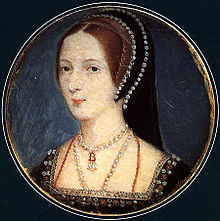| Revision as of 06:53, 9 December 2014 editVMS Mosaic (talk | contribs)Extended confirmed users, Pending changes reviewers, Rollbackers35,138 editsm →See also: rm already linked in lead← Previous edit | Revision as of 00:18, 10 February 2015 edit undo79.179.61.143 (talk)No edit summaryNext edit → | ||
| Line 14: | Line 14: | ||
| ==Differentiation== | ==Differentiation== | ||
| "Auburn" can be used to describe many shades of reddish hair with similar definitions or ]s. It is often conflated in popular usage with ]. While Titian hair is a brownish shade of red hair, auburn hair is specifically defined as including the actual color red. Most definitions of Titian hair describe it as a brownish-orange color,<ref></ref><ref></ref> but some describe it as being reddish.<ref></ref> This is in reference to red hair itself, not the color red. | "Auburn" can be used to describe many shades of reddish hair with similar definitions or ]s. It is often conflated in popular usage with ]. While Titian hair is a brownish shade of red hair, auburn hair is specifically defined as including the actual color red. Most definitions of Titian hair describe it as a brownish-orange color,<ref></ref><ref></ref> but some describe it as being reddish.<ref></ref> This is in reference to red hair itself, not the color red. | ||
| ]]] | |||
| Auburn encompasses the color ], but so too do ] and ]. In contrast with the two, auburn is more red in color, while chestnut is more brown, and burgundy is more ]; chestnut hair is also often referred to as "chestnut-brown". | Auburn encompasses the color ], but so too do ] and ]. In contrast with the two, auburn is more red in color, while chestnut is more brown, and burgundy is more ]; chestnut hair is also often referred to as "chestnut-brown". | ||
Revision as of 00:18, 10 February 2015
| This article needs additional citations for verification. Please help improve this article by adding citations to reliable sources. Unsourced material may be challenged and removed. Find sources: "Auburn hair" – news · newspapers · books · scholar · JSTOR (November 2014) (Learn how and when to remove this message) |
| Auburn | |
|---|---|
| Hex triplet | #A52A2A |
| sRGB (r, g, b) | (165, 42, 42) |
| HSV (h, s, v) | (0°, 75%, 65%) |
| CIELChuv (L, C, h) | (38, 94, 12°) |
| Source | |
| B: Normalized to (byte) | |
Auburn hair is a variety of red hair, most commonly described as reddish-brown in color. Auburn hair ranges in shades from medium to dark. Like brown hair, it is common with a wide array of skin-tones and eye-colors, but as is the case with most red hair, it is commonly associated with light skin features. The chemical pigments that cause the coloration of auburn hair are frequently pheomelanin with high levels of eumelanin.
Differentiation
"Auburn" can be used to describe many shades of reddish hair with similar definitions or hues. It is often conflated in popular usage with Titian hair. While Titian hair is a brownish shade of red hair, auburn hair is specifically defined as including the actual color red. Most definitions of Titian hair describe it as a brownish-orange color, but some describe it as being reddish. This is in reference to red hair itself, not the color red.

Auburn encompasses the color maroon, but so too do chestnut and burgundy. In contrast with the two, auburn is more red in color, while chestnut is more brown, and burgundy is more purple; chestnut hair is also often referred to as "chestnut-brown".
Etymology
The word "auburn" comes from the Old French word alborne, which meant blond, coming from Latin word alburnus ("off-white"). The first recorded use of auburn in English was in 1430. The word was sometimes corrupted into abram, for example in early (pre-1685) folios of Coriolanus, Thomas Kyd's Soliman and Perseda (1588) and Thomas Middleton's Blurt, Master Constable (1601).
Geographic distribution

Auburn hair is common among people of northern and western European descent, but it is rare elsewhere. Auburn hair occurs most frequently in, Scandinavia, Ireland, England, Scotland, Germany, the Benelux countries, France, Poland, north Iberia and Russia. This hair color is less common farther south and southeast, but can occur somewhat regularly in Southern Europe (more so in Spain, and to some extent Portugal and Italy). It can also be found in other parts of the world settled by genetically European people, such as North America, South America, Australia, New Zealand, South Africa, Siberia, etc.
Auburn hair is also found in smaller numbers in Latin America, especially southern Brazil, Argentina and Uruguay. In Argentina and Uruguay, today, auburn hair is quite common but it was very rare at the time of Independence from Spain. Auburn hair in Latin America is common among descendants of Spanish, Portuguese, Italian, French and Northern European (German, Scandinavian, British, Polish, and Russian) immigrants. This color is sometimes seen among the indigenous people of Formosa (Taiwan), but not the later Han Chinese immigrants.
See also
References
- "Titian" in the Merriam-Webster Dictionary
- "Titian" in The Free Dictionary
- "Titian" on Dictionary.com
- "Auburn" in the Online Etymology Dictionary
- Maerz and Paul A Dictionary of Color New York:1930 McGraw-Hill Page 190; Color Sample of Auburn Page 37 Plate 7 Color Sample C11
- The Wordsworth Dictionary of Phrase and Fable
- Denny, J. Anne Boleyn: A New Life of England's Tragic Queen. Da Capo Press. 2004. page 19.
External links
| Human hair color | |
|---|---|
| Hair color | |
| Hair coloring | |
| Other | |
| Shades of brown | |||||||||||||||||||||||||||||||||||||||||||||||||||||||||||||||||||||||||||||||||||||||||||||||||||||||||||||||||||||||||||||||||||||||||||
|---|---|---|---|---|---|---|---|---|---|---|---|---|---|---|---|---|---|---|---|---|---|---|---|---|---|---|---|---|---|---|---|---|---|---|---|---|---|---|---|---|---|---|---|---|---|---|---|---|---|---|---|---|---|---|---|---|---|---|---|---|---|---|---|---|---|---|---|---|---|---|---|---|---|---|---|---|---|---|---|---|---|---|---|---|---|---|---|---|---|---|---|---|---|---|---|---|---|---|---|---|---|---|---|---|---|---|---|---|---|---|---|---|---|---|---|---|---|---|---|---|---|---|---|---|---|---|---|---|---|---|---|---|---|---|---|---|---|---|---|
| |||||||||||||||||||||||||||||||||||||||||||||||||||||||||||||||||||||||||||||||||||||||||||||||||||||||||||||||||||||||||||||||||||||||||||
| A typical sample is shown for each name; a range of color-variations is commonly associated with each color-name. | |||||||||||||||||||||||||||||||||||||||||||||||||||||||||||||||||||||||||||||||||||||||||||||||||||||||||||||||||||||||||||||||||||||||||||
Categories: